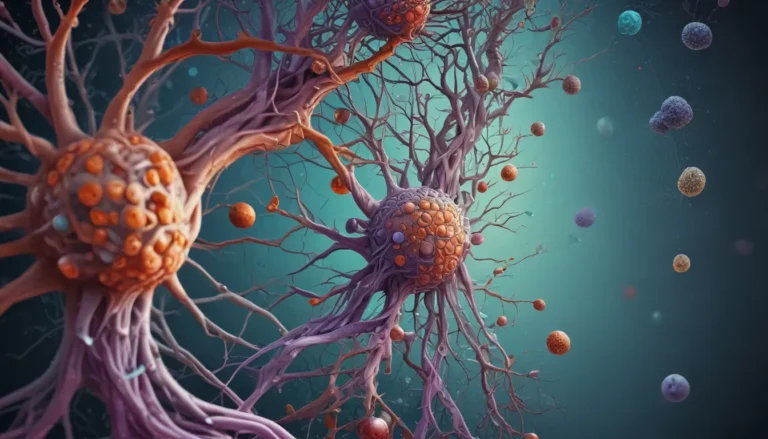A Note About Images: The images used in our articles are for illustration purposes only and may not exactly match the content. They are meant to engage readers, but the text should be relied upon for accurate information.
Cell signaling is like a secret language that cells use to communicate and coordinate vital activities within our bodies, such as growth, healing, and fighting diseases. This intricate process plays a fundamental role in nearly every aspect of biological systems, highlighting its complexity and importance. In this article, we will delve into the fascinating world of cell signaling and explore 19 mind-blowing facts that showcase the wonders of this essential biological process.
The Fascinating World of Cell Signaling
Cell signaling is a fundamental process in biology that coordinates cellular activities and ensures the proper functioning of living organisms. It involves the transmission of signals or messages between cells to regulate various physiological processes. Cells communicate through chemical signals, such as ligands, which bind to specific receptors on target cells, initiating a cascade of signaling events.
Types of Cell Signaling
Cell signaling can occur through various mechanisms, including endocrine signaling (long-range signaling through the bloodstream), paracrine signaling (local signaling to nearby cells), autocrine signaling (self-signaling), and synaptic signaling (signaling between neurons). These different types of signaling play distinct roles in coordinating cellular responses.
Signal Transduction Pathways
Signal transduction is a key process in cell signaling that converts extracellular signals into intracellular responses. When a ligand binds to its receptor, pathways are activated that translate the signal into specific cellular actions. This often involves a series of protein interactions, enzyme activation, and gene expression regulation.
Key Players in Cell Signaling
Several crucial components are involved in cell signaling, including G protein-coupled receptors (GPCRs), the Ras-MAPK pathway, Notch signaling, and Wnt signaling. These pathways regulate processes such as cell proliferation, differentiation, survival, and cell fate determination during development and tissue homeostasis.
Signaling Molecules
Molecules like cAMP and nitric oxide act as second messengers in cell signaling, relaying signals from cell surface receptors to intracellular targets. These molecules play essential roles in regulating various physiological processes, including hormone signaling, gene expression, immune response, and neurotransmission.
The Impact of Cell Signaling
Cell signaling is not just a fascinating biological process but also a critical component in maintaining homeostasis, tissue repair, and immune system function. Furthermore, aberrant cell signaling can contribute to the development and progression of diseases like cancer, autoimmune disorders, and neurological conditions.
Targeted Therapies
The understanding of cell signaling pathways has revolutionized the development of targeted therapies for diseases. By specifically targeting key molecules or pathways involved in aberrant cell signaling, these therapies offer promising treatment options for a wide range of conditions.
Challenges and Opportunities
Cell signaling is a dynamic and complex process that continues to be the focus of extensive research. Scientists are exploring new signaling pathways, uncovering connections between different networks, and identifying potential therapeutic targets for diseases associated with dysregulated cell signaling.
Exploring the Depths of Cell Signaling
Cell signaling is a captivating area of study that unravels the intricate mechanisms by which cells communicate and orchestrate the functions of living organisms. The 19 mind-blowing facts about cell signaling presented in this article provide a glimpse into the complexity and importance of this fundamental biological process. As scientists delve deeper into the world of cell signaling, new insights and connections will undoubtedly expand our understanding of biological processes.
FAQs: Cell Signaling Explained
- What is cell signaling?
-
Cell signaling is the process through which cells communicate to regulate various physiological processes by transmitting molecular signals.
-
What are the different types of cell signaling?
-
The main types of cell signaling include endocrine, paracrine, autocrine, and synaptic signaling, each with distinct mechanisms and distances of signal transmission.
-
How do cells detect and respond to signals?
-
Cells detect signals through specific receptors that bind to signaling molecules, initiating molecular events that lead to cellular responses.
-
What are second messengers in cell signaling?
-
Second messengers are small molecules that transmit signals inside a cell, amplifying the signal and triggering a cascade of intracellular events.
-
How does cell signaling contribute to diseases?
-
Aberrant cell signaling can contribute to the development of various diseases, including cancer, by disrupting normal cellular functions.
-
What are the current areas of research in cell signaling?
- Current research areas in cell signaling focus on discovering new signaling pathways, understanding crosstalk between networks, and identifying therapeutic targets for diseases associated with dysregulated signaling.
As you explore the intricate world of cellular communication, uncover more mind-blowing facts about cell signaling pathways and the fascinating realm of RNA nucleotides. Expand your knowledge, satisfy your curiosity, and appreciate the wonders of the complex processes occurring within our bodies.
Our commitment to delivering trustworthy and engaging content is evident in each fact contributed by real users like you. We ensure the highest standards of accuracy and reliability by meticulously reviewing each submission to provide fascinating and credible insights. Trust in our dedication to quality and authenticity as you explore and learn with us.






